Courses
What is the goal of all education? Great cultures have discovered that the true goal of education is similar to the goal of human life. Whatever skill is learned, from earliest childhood, should have the ultimate purpose of making a person more free, virtuous and happy. All the practical skills we learn do this to a certain extent. By learning to speak, to cook, or to build a house, we are becoming more free. However, as the ancient Greeks discovered, liberty of soul is far more important than liberty of body. A king who rules the world but is enslaved to error or vice is truly not as free as a wise and good man whose body is in chains. As long as a person is enslaved to error or vice he cannot be truly free, virtuous or happy, no matter how much wealth, influence or power he possesses. It is only knowledge of the truth and obedience to it which sets a person free. The goal of true education can never be economic prosperity, or mere leadership ability, or even empty curiosity. The goal of education must be to know the Truth.
Necessary to this type of education, traditionally, seven arts or skills have been preserved and passed on through the ages. These are Grammar, Logic, Rhetoric, Geometry, Arithmetic, Music, and Astronomy. The first three, especially, can be considered tools of learning. Dorothy Sayers describes them very well in her essay ‘The Lost Tools of Learning’. The latter four were chosen partly because the same mathematical truths are found in each of them, but in different ways. Geometry contains mathematics in space, Music contains mathematics in time, Astronomy contains mathematics in space and time, and Arithmetic contains mathematics apart from space and time.
When Christ came, as it is said, “His holy life and death were a stumbling block to the Jews, and foolishness to the Greeks”. God came to show that the wisdom of this world is foolishness, and that the important things were being revealed to little children. On the other hand, Christianity ultimately did not destroy this great heritage of mankind, but instead subjected it to Christ. The Liberal Arts were baptized by the Church, and Theology; What God has revealed to us about Himself became the ultimate goal and the mother of the Liberal Arts, with wonderful results.

WISDOM’s Socratic Dialogue Online Program can be considered a classical program in two ways. The majority of the readings are classics in Literature, Mathematics, Science, Philosophy, and Theology. Students are encouraged to avoid summaries or editorials on these books but to read the books themselves, and to gain all the truth possible from these original texts.
Learning in the online courses is through socratic dialogue, compelling the students to use their gift of reason to develop their ideas, express their interpretations, and challenge each other’s grasp of the truths contained within the text. This method strengthens the student’s memory while refining the use of correct grammar, logical thinking, and persuasive speaking.
Classical education has stood the test of time over 2,500 years because it corresponds to the way the human person develops and learns best. Students who receive a classical education tend to do very well at college or university, mainly because they have developed the art of learning and thinking rather than simply collecting information. They find it easier to categorize and order everything they are learning and recognize which information is important and which is not. They know which questions to ask, and how to pursue questioning until they find the answer. They tend to have a more voracious appetite for learning, because they have experienced learning at its best. In the quest for gaining a fuller grasp of the truth, students become adept at recognizing when something has been proven and when it hasn’t. They embrace a lifetime of fruitful enquiry and right thinking.
Find more on our website or in our Online Courses booklet.
You may also call us at 780-741-2113 or email socratic@wisdomhomeschooling.com.
All students are asked to abide by the following guidelines and common courtesies. Your agreement to these guidelines each term is required in order for you to continue taking any WISDOM online courses. Mutual trust and integrity help to make an excellent learning environment. We want all of our students to have a fruitful and enjoyable experience.
Augustine confessed that he was “one of those who write because they have made some progress and who, by means of writing, make further progress” in the spiritual life. (Letter 143) John Newman said, “writing demands humility”.
The WISDOM classical online program includes a selection of writing courses. At the heart of each of these courses is a particular focus on discovering and expressing truth and beauty.
Augustine confessed that he was “one of those who write because they have made some progress and who, by means of writing, make further progress” in the spiritual life. (Letter 143) John Newman said, “writing demands humility”.
The WISDOM Socratic Dialogue Online Program includes a selection of writing courses. At the heart of each of these courses is a particular focus on discovering and expressing truth and beauty.
No matter what the subject or content of student writing, all submissions should ultimately reflect truth and beauty. Most writing will not have a religious theme but should reveal the goodness and wisdom of God. Evil is not glorified. Good triumphs. Lies are exposed. Truth reigns.
WISDOM Virtual Classroom: NewRow
Our online program utilizes the virtual classroom, NewRow by Kaltura. This platform works within your browser window (Chrome or Firefox) and does not require a plugin or an application. (You should also have the most updated version of these browsers.)
Upon login, NewRow will remember your login information for each classroom visited, so you usually only need to log in once when using the same computer and browser.* Please be sure to use your correct name (or set of names for Junior courses) when you log in the first time. See login procedure below.
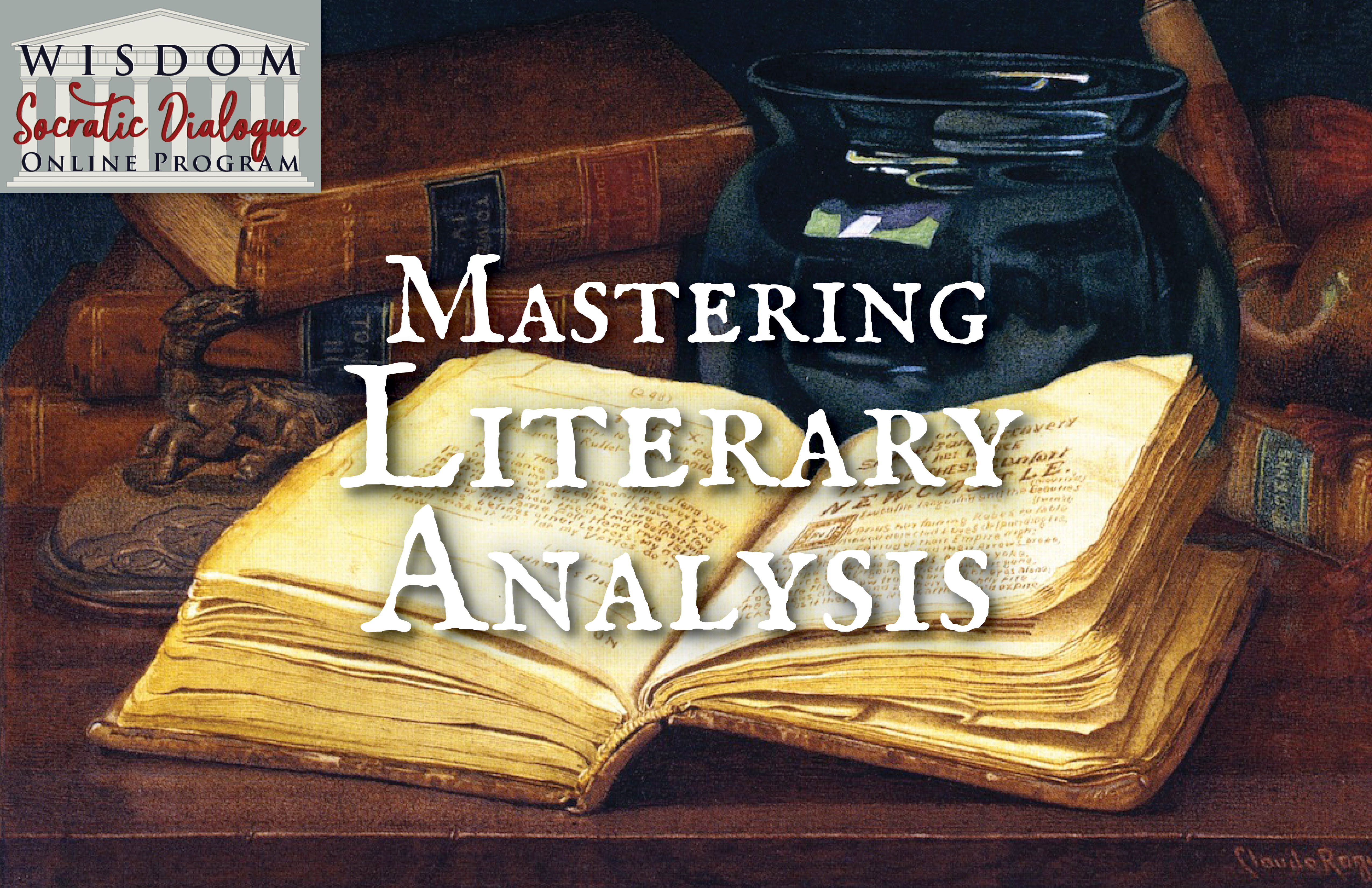
Senior Course (14 yrs and up), $335, 14 week course – Prerequisite: Intro to High School Writing (
If an interested student can demonstrate sufficient writing ability at a high school level, they can contact Nicole Noster, nicole@wisdomhomeschooling.com, for a possible exemption from the prerequisite.)
Hone your ability to read and understand great works of literature! This class will take the mystery out of formal literary analysis and give students the skills they need for upper level and collegiate literature classes. We will study different kinds of fiction, poetry, and creative non-fiction and master the technical vocabulary and skills necessary to discuss and write about literature in an academic setting. Students will complete a pre-reading assignment to discuss during each class and complete a follow-up writing assignment, including several long essays. They will also be able to discuss the writing assignments each week with the tutor in a private fifteen-minute tutorial. While this course is not specifically directed to the Alberta diploma exam, students will find that the course content will provide them with skills and experience to poise them for success in the exam. This is a challenging, upper-level course aimed towards future academic study—and a life-long love of reading!
This course is fairly time intensive, so students and parents should plan accordingly for their schedule throughout the term. Students should expect to spend approximately 6-8 hours each week on homework.
Extra private 30 minute tutorials are available upon request. (Cost: $25/tutorial)Please contact Nicole Noster to receive more information or to book additional tutorials: nicole@wisdomhomeschooling.com
To Buy:
- Pride and Prejudice (DOVER THRIFT EDITION) by Jane Austen - This edition is required for this course for ease of pagination reference during class. This edition is easily available, including on Amazon and at CHER.
- The Remains of the Day (Vintage, 2014) by Kazuo Ishiguro - As above, this linked edition is also required for ease of pagination. Copies are available on Amazon and at Chapters.
All other readings and course material are provided to students in an online format below.
Practice Week/Week 0: Fundamentals of Symbolism and Literary Analysis
- Lesson: Fundamentals (see below for reading order)
- Readings:
- How I Take Notes (Ted Gioia, The Honest Broker Substack) - read before the Lesson
- Three Level Comprehension Guide for Active Reading - read before the Lesson
- Aesop's Fables Selection - read after the Lesson
- Fairytales Selection: Goldilocks & the Three Bears & The Gingerbread Man - read after the Lesson
Week 1: Fundamentals of Symbolism and Literary Analysis, cont.
- Lesson: Fundamentals, cont.
- Readings:
Week 2: The Short Story, Part 1
- Lesson: The Short Story 1
- Readings
- The Gift of the Magi by O.Henry
- The Fly by Katherine Mansfield
- The River-Merchant's Wife by Ezra Pound
Week 3: The Short Story, Part 2
- Lessons: The Short Story 2
- Readings:
- Araby by James Joyce
- Gorilla, My Love by Toni Cade Bambara
- Using Quotations in Literary Analysis
Week 4: The Short Story, Part 3
- Lessons: The Short Story 3
- Readings:
- The Planning Stage: Basic Essay Brainstorming & Outlining
- The Ambition of the Short Story by Steven Millhauser
- Babette's Feast by Isak Dinesen
Week 5: Close Reading - The Sonnet
- Lesson: The Sonnet
- Readings:
Week 6: Close Reading - The Sonnet, cont.
- Lesson: The Sonnet
- Readings:
- Understanding John Milton's Poem "On His Blindness"
- Close Reading by Erik Simpson
Week 7: Close Reading - Lyric Poetry
- Lesson: Lyric Poetry
- Readings:
- Definition of a Horse from Hard Times
- Lyric Poetry Selections
- Essay Structure: Intros and Conclusions
- Review this handout from Lesson 4: Basic Essay Brainstorming and Outlining
- Review this handout from Lesson 1: Example MLA Formatting
- Optional Reading: If you are up for a challenge and have some extra time, read through the essay by Louise Cowan, Introduction: The Lyric Nostalgia
Week 8: The Novel - Pride & Prejudice
- Lesson: The Novel: Pride & Prejudice, Part 1
- Readings:
- Pride and Prejudice (Dover Thrift Edition) by Jane Austen, through page 61 (Chapter XVII)
- "Pride and Prejudice in its Literary and Historical Context"
- Revision & Proofreading
Week 9: The Novel - Pride & Prejudice, Part 2
- Lesson: The Novel: Pride & Prejudice, Part 2
- Readings:
- Pride and Prejudice, through page 138 (Chapter XXXV)
- Review the handout from Lesson 5: Writing Strong Body Paragraphs
- Please take a brief look at this website which has maps, geographical, and historical information about Pride and Prejudice. You needn't study it, but it will help you understand the setting of this novel: https://jasna.org/austen/works/maps-of-the-novels/
- This reading is not required, but if you have the time and are interested in learning more about the economics of Jane Austen's world and how its money translates to our own, I recommend this article: https://jasna.org/publications-2/persuasions-online/vol36no1/toran/
- Note that JASNA.org is one of the most best and most reputable online sources for essays and information about Jane Austen's novels and world.
- Rhetorical devices—If you did not look at these websites last week, give them a skim this week as they are helpful tools for understanding rhetorical devices, an important aspect of literature of which Austen's original audience would have been very aware.
- https://www.excellence-in-literature.com/figures-speech-schemes-tropes/ - This is a good introduction to tropes and schemes which goes into more detail.
- http://rhetoric.byu.edu/ - This is a very fun resource about rhetoric and includes an almost exhaustive dictionary of literary tropes and schemes
Week 10: The Novel - Pride & Prejudice, Part 3
- Lesson: The Novel: Pride & Prejudice, Part 3
- Readings:
- Pride and Prejudice, through page 210 (Chapter L)
- Introduction: The Comic Terrain by Louise Cowan
Week 11: The Novel - Pride & Prejudice, Part 4
- Lesson: The Novel: Pride & Prejudice, Part 4
- Readings: Pride and Prejudice, finish the novel
Week 12: The Novel - Remains of the Day, Part 1
- Lesson: The Novel: Remains of the Day, Part 1
- Reading:
- The Remains of the Day by Kazuo Ishiguro, through page 110 (end of "Salisbury")
- Review this handout from Lesson 8: Revision & Proofreading
Week 13: The Novel - Remains of the Day, Part 2
- Lesson: The Novel: Remains of the Day, Part 2
- Reading:
- The Remains of the Day, through page 201 (through "Day Three")
- Article by Ishiguro: In this piece, Ishiguro talks about writing a previous novel, but what he says is very relevant to The Remains of the Day and also offers a little window onto Ishiguro himself.
Week 14: The Novel - Remains of the Day, Part 3
- Lesson: The Novel: Remains of the Day, Part 3
- Reading:
- The Remains of the Day, finish the book
- Optional: If you have time and inclination, read the first few chapters of P.G. Wodehouse's hilarious Right Ho, Jeeves. The Jeeves and Wooster series would have been extremely well-known to Ishiguro's original English audience, and this comedic take on the butler/aristocrat relationship is something Ishiguro alludes to a few times. There is a free and well-read version by Mark Nelson that you can listen to on LibriVox. The Remains of the Day is a great novel, but rather a somber one, and if you need a little lift before the summer, I highly suggest amusing yourself by listening to Right Ho, Jeeves while you do chores this week. (If you remember the weird newt-breeding comment Stevens makes in RotD, it is, I am pretty sure, an allusion to Right Ho, Jeeves).
- Full Text: https://www.gutenberg.org/cache/epub/10554/pg10554-images.html
- Free LibriVox Audiobook: https://librivox.org/right-ho-jeeves-by-p-g-wodehouse/
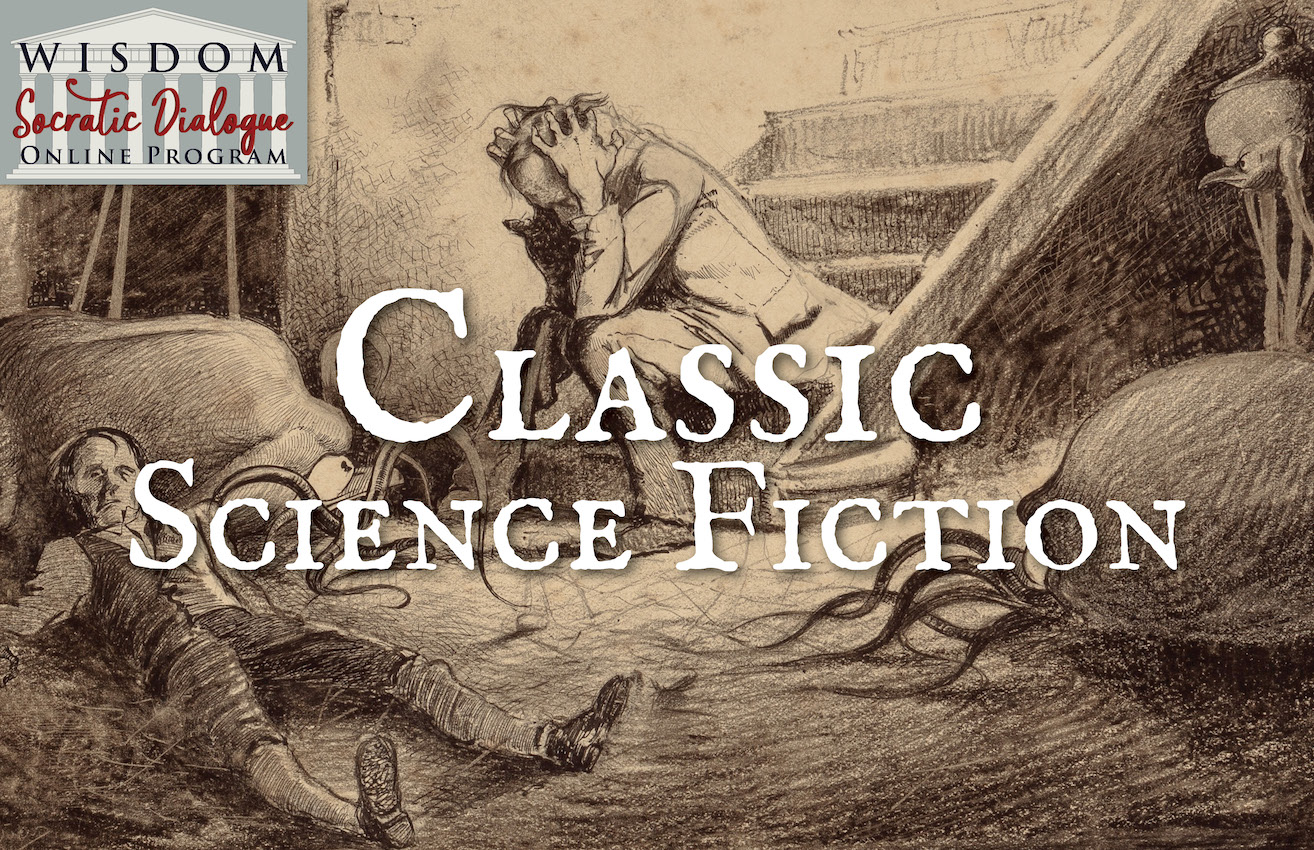
Intermediate Course (13 yrs and up), $185 – No Prerequisite
An overview of some of the thrilling tales which helped to provide the foundation for one of the most popular modern genres, Classic Science Fiction explores stories of fantastic futuristic feats and astonishingly ambitious adventures. We will discuss the true nature of heroism and bravery, as well as the ethics and philosophy of science itself in our unpacking of these gripping classics.
To Buy:
- I, Robot by Isaac Asimov
(This is a solitary volume, not a part of Asimov's "Robot Series". The title should just be "I, Robot". Here is an example available on Amazon.)
All other readings are provided in an online format below, but we recommend that hard copies be obtained for ease of reading.
Week 1: From the Earth to the Moon by Jules Verne, Ch.1 - 14
Week 2: From the Earth to the Moon, Ch.15 - 28
Week 3: Round the Moon by Jules Verne, Preliminary Chapter - Ch. 9
Week 4: Round the Moon, Ch.10 - 23
Week 5: The Time Machine by H.G. Wells, Ch.1 - 6
(Some editions might have this as an untitled chapter 4 – the reading is the same; the chapter should end with the line: “Very simple was my explanation, and plausible enough—as most wrong theories are!”)
Week 6: The Time Machine, Ch.7 - 16
Week 7: The War of the Worlds by H.G. Wells, Book 1 (all)
Week 8: The War of the Worlds, Book 2 (all)
Week 9: The Lost World by Sir Arthur Conan Doyle, Ch. 1 - 9
Week 10: The Lost World, Ch. 10 - 16
Week 11: Out of the Silent Planet by C.S. Lewis, Ch. 1 - 13
Week 12: Out of the Silent Planet, Ch. 14 - Postscript
Week 13: I, Robot by Isaac Asimov, Introduction - Ch. 5
(This is a solitary volume, not a part of Asimov's "Robot Series". The title should just be "I, Robot". Here is an example available on Amazon.)
Week 14: I, Robot, Ch. 6 - 9

14 yrs and up, $175, 14 week course - Prerequisite: Foundational Great Books
This course will immerse students in an examination of our wider cosmos as they come to understand the purpose of studying Astronomy and how it points to a great symmetry and design in the cycle of the heavens. Through the writing and mathematical hypothesis of the ancient astronomers, students will investigate the movements of astronomical bodies and how their early understanding progressed to our knowledge of the heavens today.
All readings and course material are provided to students in an online format below.
Potential Projects:
- Observing the setting of the Sun, time based upon a point of reference location.
- The movement of the stars across the sky, through choosing one star close to the horizon and noting the time it sets.
- Noting the phases of the moon throughout the month.
- Observations of the planets either hands on, or through of the use of Stellarium (software program)
Reading List:
(page numbers for PDFs follow the PDF numbering, not the original document page numbers)
Week 1:
- The Almagest by Ptolemy: Book 1, Chapters 1–2 (pg. 35-37) - Preface, On the Order of the Theorems
- Introductory Astronomy by Dr. Michael Augros: Day 1, Exercises 1-7 (pg. 1-5)
Week 2:
- Introductory Astronomy: Day 1, Phenomena related to Exercises 1-7 (pg. 5-8)
Week 3:
- The Almagest: Book 1, Chapters 3–4 (pg. 38-41) - That the Heavens Move Spherically, That the Earth Taken as a Whole Is Sensibly Spherical
- Introductory Astronomy: Day 2 (pg. 9-15)
Week 4:
- The Almagest: Book 1, Chapter 5 (pg. 50-51) - That the Earth is in the Middle of the Heavens
- Introductory Astronomy: Day 3 (pg. 16-22)
Week 5:
- The Almagest: Book 1, Chapters 6–7 (pg. 52-54) - That the Earth has the Ratio of a Point to the Heavens, That the Earth Does Not in Any Way Move Locally
- Introductory Astronomy: Day 4 (pg. 23-30)
Week 6:
- The Almagest: Book 1, Chapter 8 (pg. 54-56) - The Two Motions of the Heavens
- Introductory Astronomy: Day 5 (pg. 31-38)
Week 7:
- The Almagest: Book 3, Chapter 3 (pg. 58-70) - Hypotheses as to Uniform Circular Motion
- Introductory Astronomy: Day 17 (pg. 117-123)
Week 8:
- The Almagest: Book 9, Chapter 1-2 (pg. 71-75) - On the Order of the Spheres of the Sun, Moon, and Five Planets
- Perry Translation of and Commentary on Ptolemy’s Almagest: Preliminaries to Book 9
Week 9:
- On the Revolutions of the Heavenly Spheres by Nicolaus Copernicus, Forward “To The Reader,” Preface and Dedication to the Pope Paul III
- Introductory Astronomy: Day 27 (pg. 201-206)
Week 10:
- On the Revolutions of the Heavenly Spheres, Book 1, Introduction, Chapters 1-2 & 4-6 (The World is Spherical; The Earth is Spherical Too; The Movement of the Heavenly Bodies; Does the Earth Have a Circular Movement? And of its Place; On the Immensity of the Heavens in Relation to the Magnitude of the Earth)
- Introductory Astronomy: Day 28 (pg. 207-213)
Week 11:
- On the Revolutions of the Heavenly Spheres, Book 1, Chapters 7-8 (Why the Ancients Thought The Earth was At Rest at the Middle of the World; Answer to the Aforesaid Reasons and Their Inadequacy)
- Introductory Astronomy: Day 29 (pg. 214-220)
Week 12:
- On the Revolutions of the Heavenly Spheres, Book 1, Chapters 9-10 (Whether Many Movements Can be Attributed to the Earth, and Concerning the Center of the World; On the Order of the Heavenly Orbital Circles)
- Introductory Astronomy: Day 30 (pg. 221-227)
Week 13:
- On the Revolutions of the Heavenly Spheres, Book 1, Chapter 11 (A Demonstration of the Threefold Movement of the Earth)
- Introductory Astronomy: Day 31 (pg. 228-232)
Week 14: Lecture: What has Happened in Astronomy Since Copernicus? A Brief Overview of Kepler, Newton and Einstein

14 yrs and up, $175, 14 week course – Prerequisite: Foundational Great Books
In this course, students will learn and appreciate the ancient approach of the study of the natural world in the context of living things. This course will discuss the methods and fundamental questions of classic natural science. How do we come to know about the natural world? What are the principles of nature? What kind of knowing is instinct? What does it mean to be “alive”?
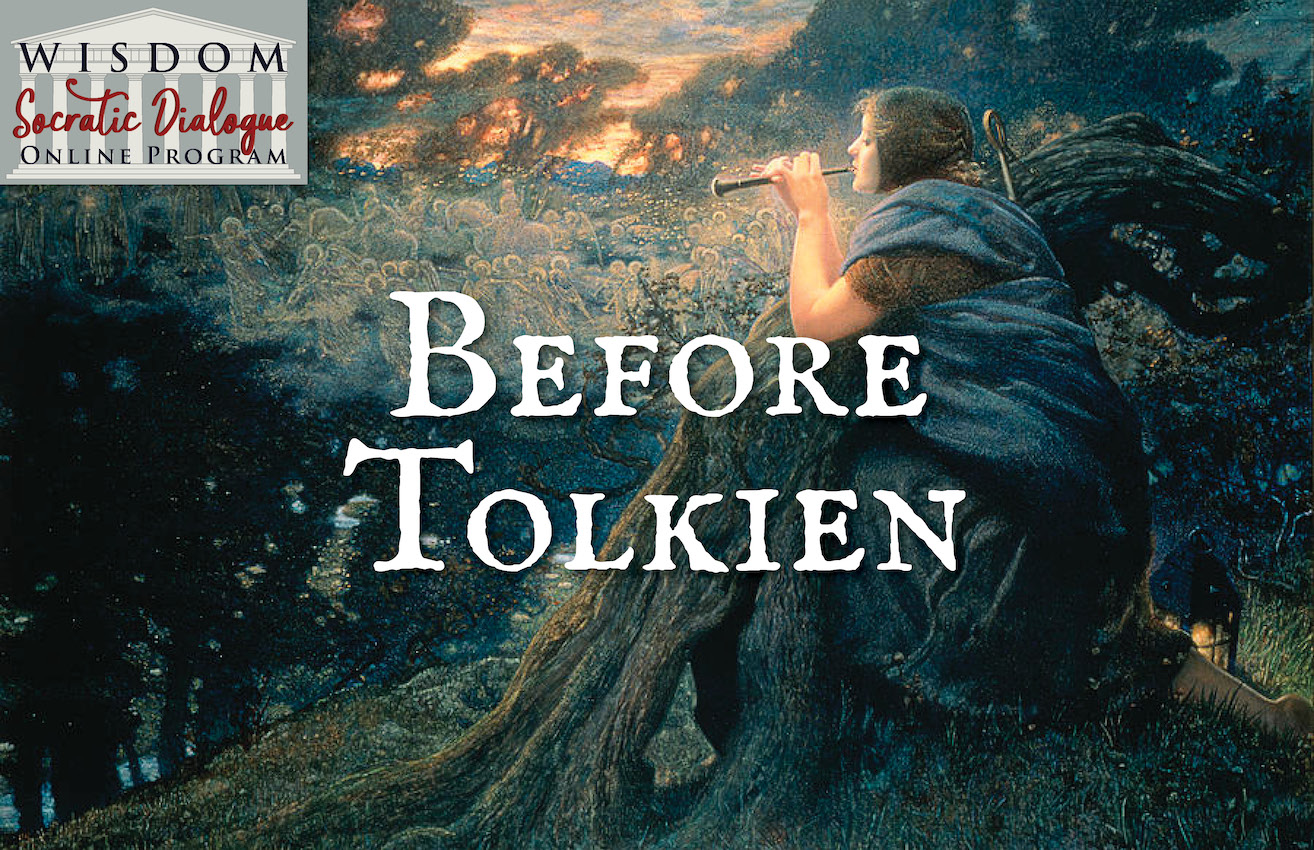
14 yrs and up, $185 - Prerequisite: Must have read The Hobbit and The Lord of the Rings Trilogy
Sojourn through the ages, reading Greek and Norse mythology and Christian tales. Each class will take time to discuss Tolkien’s works in light of the bigger, weekly discussions. The reading list includes titles that influenced J.R.R. Tolkien and his writings, and students can begin to glimpse the great wealth of inspiration that inspired the timeless characters of Tolkien's work. While some readings may be challenging, they serve as a great reminder of the early legends and stories that continue to shape our culture and persistently fascinate the imagination.

13 yrs and up, $175 – No Prerequisite
By utilizing the Socratic Method of discussion, students will uncover timeless truths embedded in Nicholas Nickleby.Hot-tempered, daring, and wonderstruck Nicholas Nickleby breaks the law to save his friend Smike from his tyrannical, one-eyed master. Only nineteen years old, the two of them find themselves on the run, seeking their fortune wherever they can find it. Hilarity strikes as Nicholas finds himself in crazy situations only Dickens could dream up, but he must also use his wits and his fists against an array of villains who are determined to destroy him. Drama, humour, true love, tragedy, and surprises abound in a young Charles Dickens’ masterpiece.

12 yrs and up - $175.00 - 14 week course – No Prerequisite
Robert Schumann, pianist and composter, said, "To send light into the darkness of men's hearts - such is the duty of the artist." In this course, students will listen to the works of the masters, spanning the centuries, and discover the light that music sheds in the understanding of truth. Through the use of audio and visual activities and exercises, as well as reading, the students will experience the historical processes by which musical styles grow, develop, mature, and decline.
This course covers the music periods of Romantic (1860-1920) through to the modern era.
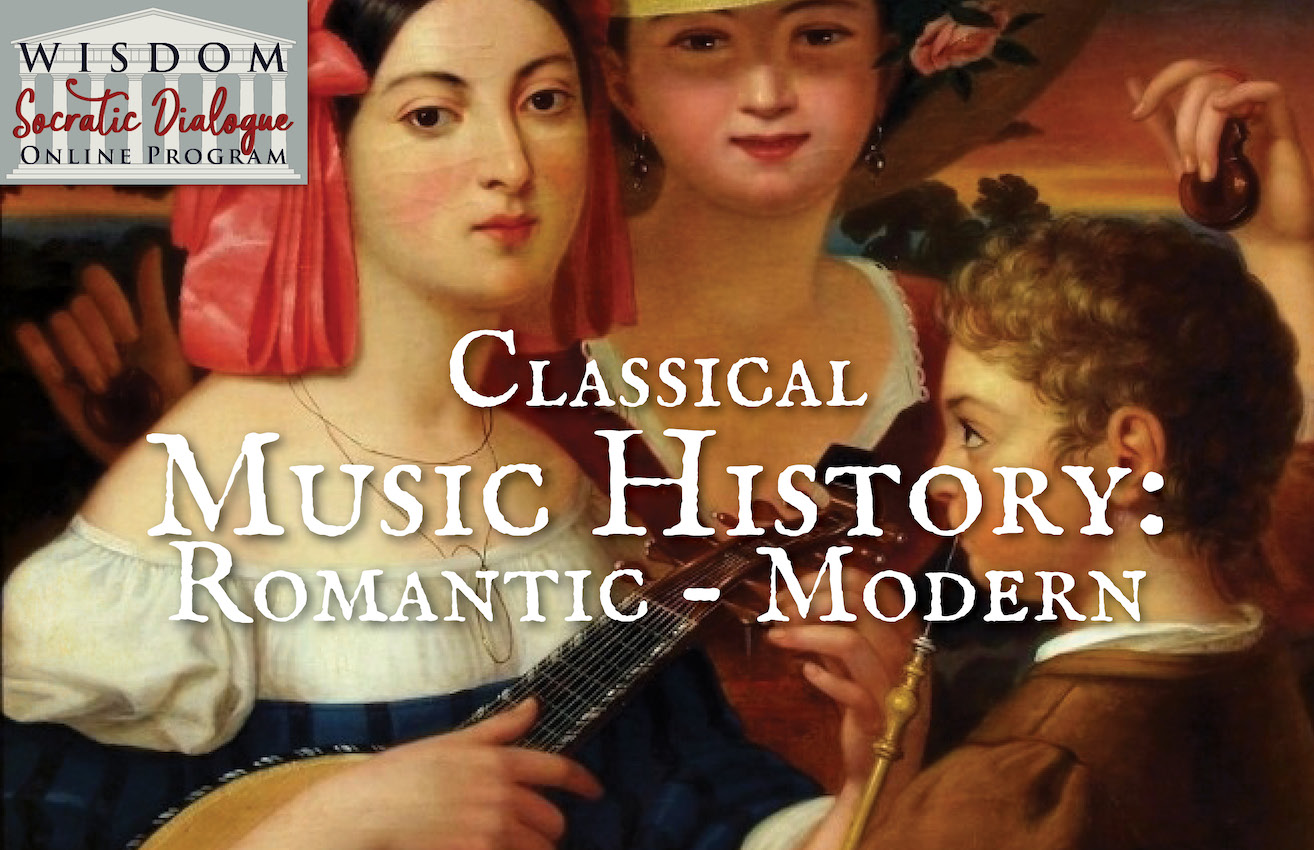
Intermediate Course (12 yrs and up), $185, 14 week course – No Prerequisite
It has been said by many that "Music is the universal language of mankind"; music tells a story through the use of sound to convey emotion and depict imagery throughout the ages. In this course, students will listen to the works of the masters, spanning the centuries, and discover the light that music sheds in the understanding of truth. They will engage in listening activities, readings, and class discussion to experience the historical processes by which musical styles grow, develop, mature, and decline. This process will help them to make connections between historical eras, art and music to understand the role music plays in the bigger picture of the elements that have shaped our cultures and societies.
This course covers the music periods of medieval music (1150-1400) through to the late Romantic era (1860-1920).
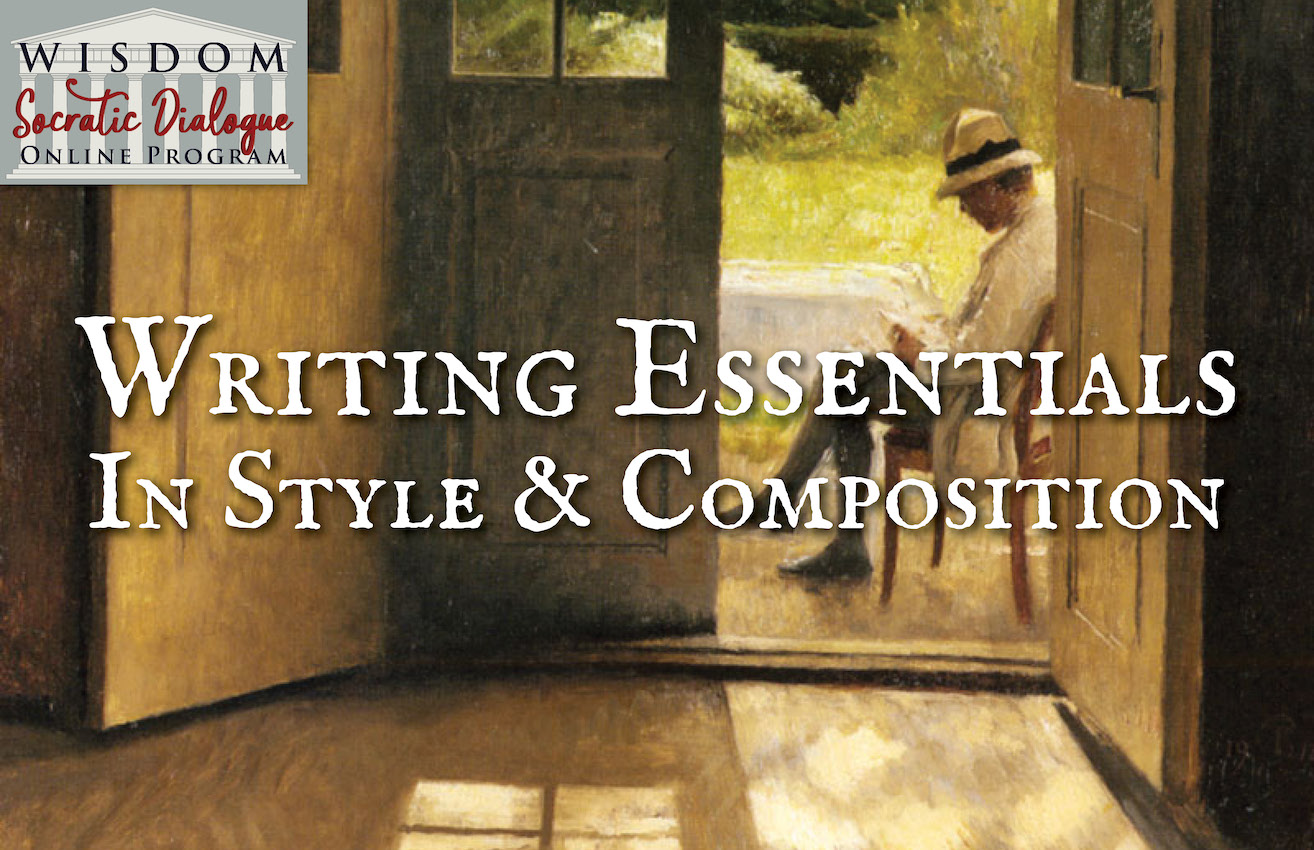
Senior Course (14 yrs and up), $325, 14 week course – Prerequisite: Intro to High School Writing or Mastering the Essay
This course is a sequel to the prerequisite courses. Like Intro to High School Writing and Mastering the Essay, it is a practical course designed to help the students improve their writing skills by expanding their writing experience through a diverse collection of styles. Students will delve deeper into specific writing genres, such as critique, allegory, persuasion, and tragedy, and continue to hone their writing abilities in preparation for any post-secondary choices. In this high school level writing course, the writing study will be enriched by pertinent selections for discussion from classic literature. This course includes a weekly private tutorial time in addition to the weekly assignment.
Extra private 30 minute tutorials are available upon request. (Cost: $25/tutorial)
Please contact Nicole Noster to receive more information or to book additional tutorials: nicole@wisdomhomeschooling.com
All lessons and readings are provided to students in an online format below.
Week 1: Descriptive Writing
Week 2: Critiquing, Evaluating, & Judging
Week 3: Metaphor & Simile
Week 4: Verse
Week 5: Allegory, Parable & Fable
Week 6: Logical Argument
Week 7: Persuasive Writing: Logos
Week 8: Persuasive Writing: Pathos
Week 9: Persuasive Writing: Ethos
Week 10: Dialogue
Week 11: Tragedy
Week 13: Film Script: Part I
Week 14: Film Script: Part II
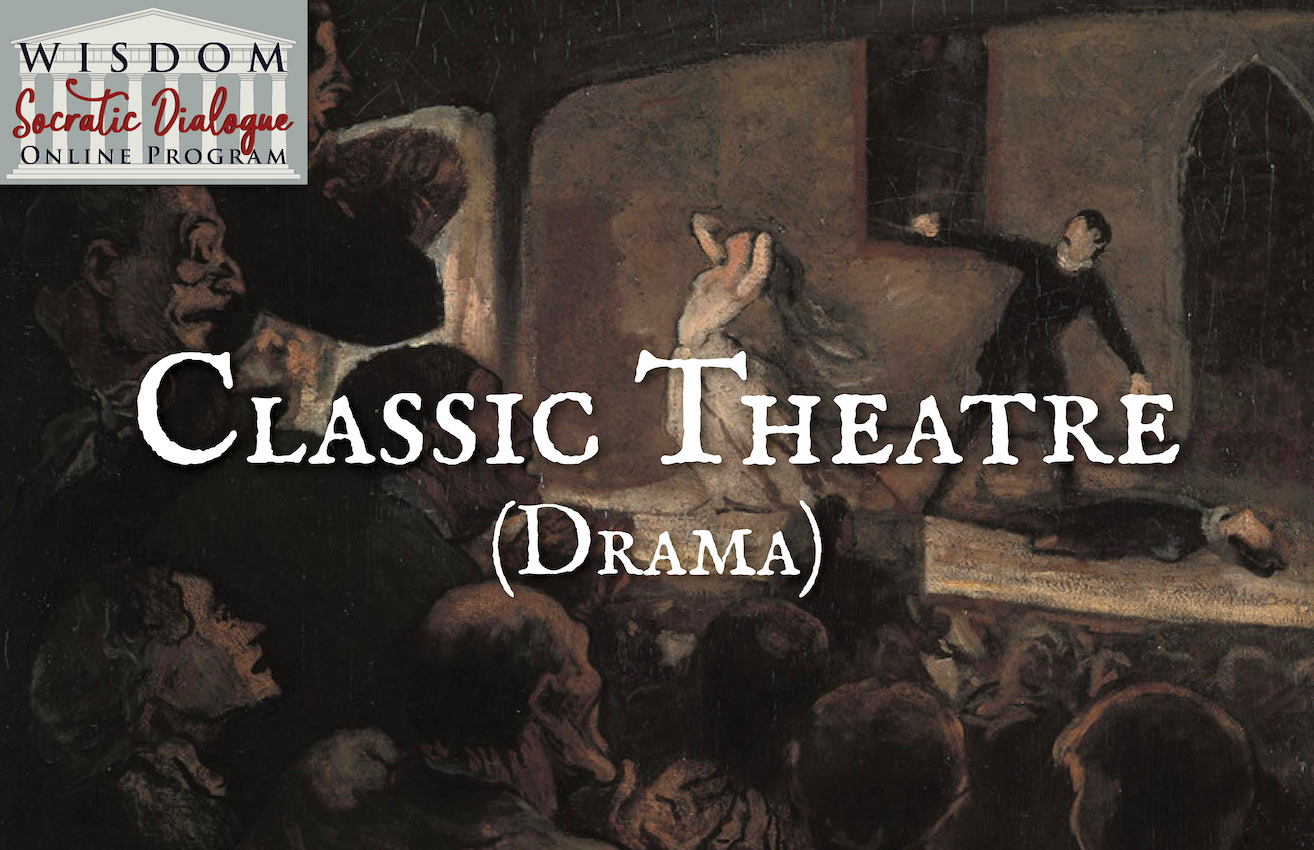
14 yrs and up, $195, 14 week course – Prerequisite: One Intermediate Level course
A girl secretly helps an enemy soldier to escape from the soldiers of her own country – and finds herself bound to a dangerous game of secrecy. A Russian village is convinced that a spy is among them – unaware that he is only a bored young man with a tremendous imagination who loves to see what he can get away with. A king and a humble gondolier were mixed up at birth – now that they are of age, not even they know which should inherit the crown! Lights dim, the curtain rises, and the audience is swept away by side-aching laughter, fantastic thrills, and deeper questions that stay with us. Students read through the scripts of these timeless plays, and get a chance both to discuss them Socratically and to perform scenes from them in class, readers’ theatre style. From Shaw to Shakespeare to Sophocles, come unleash your flair for the dramatic, and dive into some of the world’s greatest works of theatre.
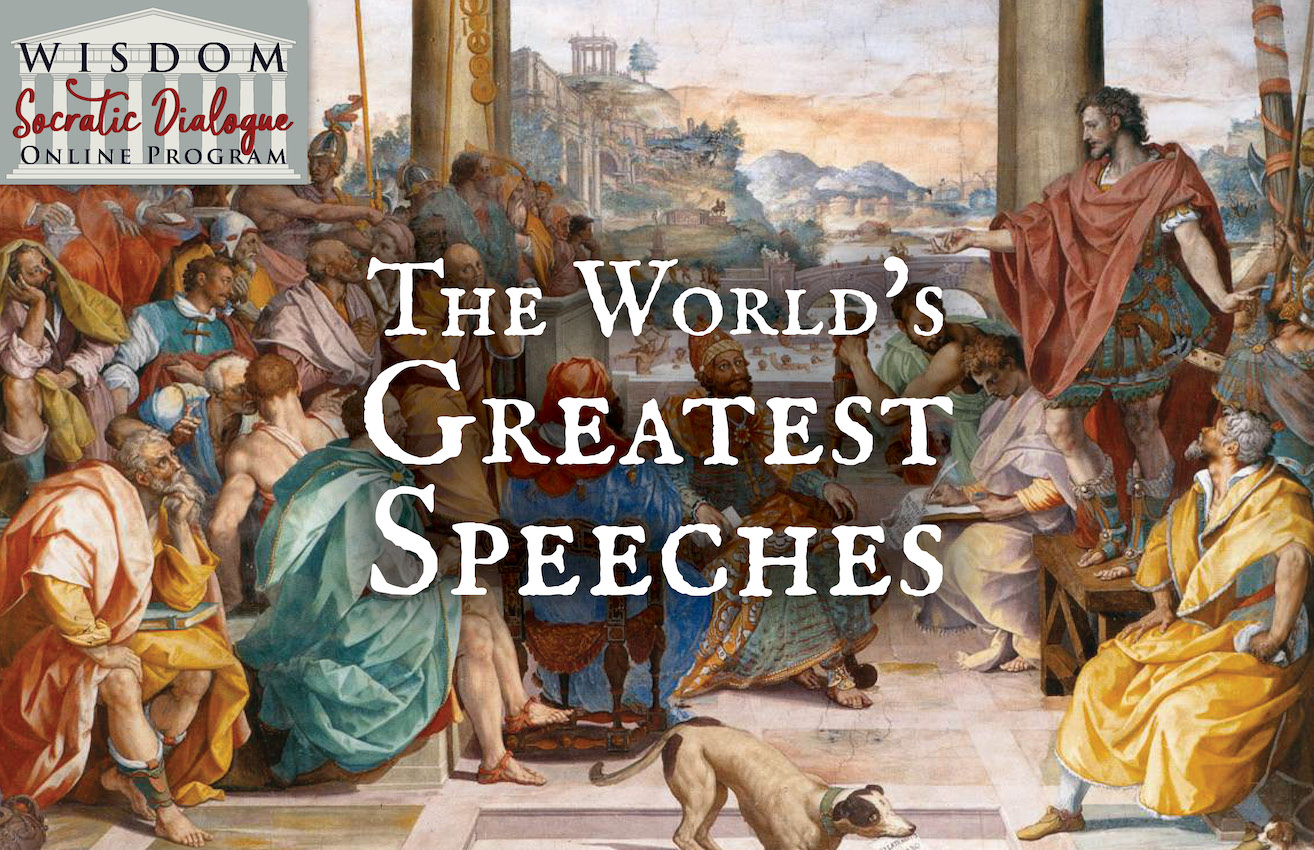
Senior Course (14 yrs and up), $185, 14 week course – Prerequisite: One Intermediate Level course
In the Rhetoric, Aristotle states that, “It is absurd to hold that a man should be ashamed of an inability to defend himself with his limbs, but not ashamed of an inability to defend himself with speech and reason; for the use of rational speech is more distinctive of a human being than the use of his limbs.” There is no doubt that Rhetoric has been used in the World’s greatest speeches in order to persuade man to fight and believe in a cause. This class will explore many of the world’s greatest speeches and judge them through the light of Aristotle’s Rhetoric and through their own merits. What makes a speech great, even once the time for action has passed? How does one know when Rhetoric is being used for a good, or bad, cause?
The Speeches studied in the course reach from Ancient Greece, to Christ’s Sermon on the Mount, and the 40th Anniversary of D-Day. It will cover speeches from the World Wars, the Abolition of the Slave trade, as well as Nobel Peace Prize Acceptance Speeches.
